The Senate on Monday unanimously passed a bipartisan bill aimed at cracking down on sexual assault in the military by providing victims help in reporting attacks.
Sen. Carl Levin, chairman of the Senate Armed Services Committee, told the Senate that the Victims Protection Act of 2013 "will make a serious contribution to protecting the troops that protect us."
The vote comes at a time when the services have seen senior officers , including those responsible for educating fellow troops on the issue of sexual assault, arrested and prosecuted for sexual assault-related crimes. The Army's top Army prosecutor for sexual assault cases is currently under investigation for allegedly groping a female attorney two years ago.
And at Fort Bragg, N.C., on Monday, a military judge refused to dismiss a case against an Army brigadier general who allegedly forced a female captain to perform oral sex on him twice while deployed to Afghanistan.
The legislation will remove the so-called "good soldier defense," which has allowed defendants to use "good military character" as a consideration in their favor. It also makes a commander responsible for establishing an atmosphere within the command where a victim of sexual assault feels free to report it.
In addition, a commander's decision not to prosecute sexual assault is subject to review by higher authority, including an automatic review if it conflicts with the military prosecutor's recommendation.
The law will provide required special counsels to advise victims of the advantages and disadvantages of a case being prosecuted in the military or civilian justice systems, and gives victims a say in the venue. Victims will also have the right to challenge their discharge or separation from the military and gives the prosecutor more of a role in advising commanders on going to court martial with a sexual assault case.
There was no debate on the measure before it was voted at about 6:30 pm. Neither Sens. Claire McCaskill, D-Mo., nor Kelly Ayotte, R-NH, the bill's principal sponsors, spoke on it. Levin outlined some of the provisions, saying it includes "real and important reforms" to the system of handling sexual assault cases.
The bill's passage on Monday came after the Senate last week failed to pass a military sexual assault bill introduced by Sen. Kirsten Gillibrand, D-NY.
Gillibrand's bill would have stripped commanders of their power to decide which cases are prosecuted – something opposed by the Pentagon brass from the start – and give that to military prosecutors. Levin last summer impeded Gillibrand's bill when he substituted another for it that retained command authority.
McCaskill, Ayotte and others contend the commander is an important part of the military justice system, and that eliminating that role would not result in more sexual assault reports, trials or convictions.
Members of the Response Systems Panel, a seven-member group put together to review military sexual assault investigations and prosecutions, also took that position.
McCaskill and Ayotte both said they initially supported Gillibrand's bill, but were convinced by the panel's findings.
After her bill went down in defeat on Thursday Gillibrand issued a statement saying that McCaskill's bill would be a step in the right direction for holding offenders accountable. But she also criticized the Senate's vote as a failure to support the victims of military sexual assault who came forward.
McCaskill, in an interview published Sunday in The Washington Post, said she is frustrated with the perception that her bill does not show as much concern for the victims as Gillibrand's did.
"The most frustrating thing about this," she told the Post, "is the narrative that, ‘Whose side are you on, the victim's or the commander's?' That's offensive."
Military sexual assault, with both female and male victims, came to national attention about a year ago when the Pentagon released a study estimating that 26,000 instances of unwanted sexual contact had occurred in 2012, an increase of more than 30 percent since 2010.
About 3,000 cases of sexual assault were reported in the military in 2012, and 300 were prosecuted, the Pentagon said.
-- Bryant Jordan can be reach at bryant.jordan@monster.com



























